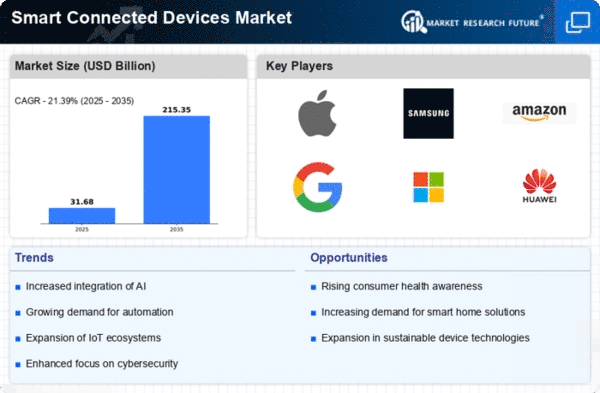Top Industry Leaders in the Smart Connected Devices Market

The Competitive Landscape of the Smart Connected Devices Market
The Smart Connected Devices market, where gadgets whisper insights and appliances sing symphonies of data. In this dynamic arena, established tech giants and nimble innovators clash, all vying for a bigger share of the interconnected melody composed of sensors, connectivity platforms, and intelligent functionalities. From smart homes buzzing with automated routines to factories thrumming with optimized production, these devices weave the network threads of a future fueled by convenience, efficiency, and data-driven insights. Let's dissect the key strategies and players shaping this captivating scene.
Key Player:
- Intel Corporation
- iSolution international Pvt. Ltd
- Broadcom Corporation
- OMCS International
- Freescale Semiconductor, Inc.
- Maintenance Assistant Inc.
- ARM holding plc
- Bentley systems incorporated
- Texas Instruments
- Cypress Semiconductor
- ABB Ltd
- Rockwell Automation
- NXP Semiconductor
Strategies Adopted by Market Leaders:
- Technological Differentiation: Companies compete fiercely on technological advancements, focusing on factors like improved connectivity protocols for faster and more reliable communication, enhanced security features for data protection, AI-powered functionalities for automated control and proactive insights, and interoperability with diverse platforms for seamless smart home ecosystems. Developing open-source platforms, offering voice control integrations, and customizing data analytics are key differentiators.
- Expanding Application Reach: Moving beyond traditional consumer electronics applications to address the needs of diverse industries like healthcare, energy management, agriculture, and smart cities unlocks new market segments and drives wider adoption. Developing smart medical devices for remote monitoring, energy-efficient smart thermostats for building management, connected agricultural sensors for improved yields, and intelligent traffic management systems for smart cities are crucial.
- Addressing Affordability and Accessibility: Making smart devices more affordable and accessible is vital for widespread adoption, particularly in developing economies and budget-conscious households. Offering a range of price points, developing modular and scalable solutions, and providing user-friendly apps and tutorials are key strategies. Fostering open standards and promoting interoperability can also reduce costs and increase accessibility.
- Building Partnerships and Collaborations: Fostering partnerships with device manufacturers, chipmakers, cloud service providers, software developers, and industry leaders accelerates innovation, shares expertise, and expands market reach. Collaborating on pilot projects, developing integrated solutions with different devices, and promoting the benefits of smart devices for improved efficiency, data-driven decision making, and enhanced user experience contribute to market growth.
Factors for Market Share Analysis:
- Revenue Generated: This straightforward metric reflects a company's market penetration and financial strength.
- Number of Connected Devices Shipped: Understanding the volume of deployed devices provides insight into market reach and customer adoption.
- Technology Advancements: Assessing a company's investment in R&D, patent portfolio, and cutting-edge smart device technologies helps gauge its future competitive edge.
- Consumer Satisfaction: Analyzing user feedback and loyalty metrics reveals how effectively a company caters to customer needs and builds brand reputation.
New and Emerging Companies:
The influx of innovative startups is adding new notes to the smart connected devices narrative. Companies like Sensi Labs Inc. (USA), Ecobee Inc. (Canada), and Brilliant Controls Inc. (USA) introduce novel solutions like self-learning thermostats that adapt to user preferences, AI-powered air purifiers that monitor and optimize air quality, and smart light switches with built-in touchscreens for centralized home control. These advancements redefine the possibilities of smart devices and unlock new market segments for personalization, proactive environmental control, and seamless home automation experiences.
Industry Developments:
Samsung Electronics (South Korea):
- January 9, 2024- Launched an AI-powered refrigerator that detects food spoilage and recommends recipes based on dietary preferences.
Apple Inc. (USA):
- November 10, 2023- Introduced a sleep tracking feature in their smartwatches, analyzing sleep patterns and offering personalized sleep coaching.
Amazon.com Inc. (USA):
- October 6, 2023- Partnered with a leading home security company to integrate their smart doorbells with Amazon's security service for enhanced home protection.









